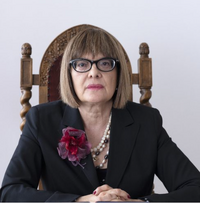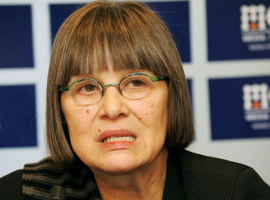- Poruka
- 4.126
Ово није никакво позивање на насиље над Кандићком. Кандићка игнорише да је над Србима почињено највише зверства и етничко чишћење. Ко плаћа Кандићку да води најгору могућу антисрпску пропаганду против Срба? Хашки трибунал је игнорисао етничко чишћење и геноцид над Србима. Све то игнорише и Кандићка:
https://www.nytimes.com/2012/12/08/opinion/global/selective-justice-for-the-balkans.html?_r=1Selective Justice for the Balkan
TOO bad if you were a Serb victim of any crime in the former Yugoslavia.
More Serbs were displaced — ethnically cleansed — by the wars in the
Balkans than any other community. And more Serbs remain ethnically
displaced to this day. Almost no one has been held to account, and it
appears that no one will be.
http://www.hri.org/news/balkans/yds/1996/96-03-01.yds.html#12SERBS HELD IN BOSNIAN MUSLIM CAMPS TESTIFY BEFORE WAR CRIMES TRIBUNAL
They said a preliminary list identifying the sites of more than 30 mass graves in Sarajevo in which Serb victims were buried had been presented to the tribunal's investigators and a request made for proceedings to be instituted against persons responsible for the illegal trials of many Serbs in Sarajevo.
Association's lawyer Dragan Vasiljevic said information had been received that tribunal's investigators had heard in the United States the testimonies of 9 Serbs, former camp inmates, and were to hear 60 more.
Some of the witnesses, Serbs held at the Tarcin, Trnovo, Igman, Celebici and Musale camps near Konjic, told the news conference about the physical and psychological torture and other horrors they had gone through at the Muslim camps.
http://www.david-morrison.org.uk/kosovo/kosovo-humanitarian-catastrophe.htmHow NATO’s “humanitarian intervention” in Kosovo
led to a humanitarian catastrophe
The truth is that, far from saving “the lives of tens of thousands of people”, as Miliband asserted, by bombing Yugoslavia in 1999, NATO caused the deaths of thousands of civilians
After 78 days of NATO bombing, Serb forces withdrew from Kosovo. This was followed by the ethnic cleansing of nearly a quarter of a million Serbs and other minorities from Kosovo.
NATO’s “humanitarian intervention” in Kosovo led to a humanitarian catastrophe
KLA vs Yugoslav forces
In 1998, Yugoslavia consisted of two republics – Serbia and Montenegro. Kosovo was an integral part of Serbia, but with an overwhelmingly Albanian majority that favoured separation from Serbia, and a Serb minority that opposed separation.
At that time, what was going on in Kosovo was a military campaign by the Kosovo Liberation Army (KLA or UCK) for an independent state separate from Yugoslavia and military action by Yugoslav armed forces (police and army) to suppress that campaign.
Before 1998, the KLA military campaign was a sporadic affair but in 1998 it took off dramatically. Before 1998, there might have been 100 KLA attacks in total; in 1998 there were of the order of 2,000. The KLA attacked Yugoslav police, on patrol and in barracks, Serb civilians, and Albanian civilians who were deemed by the KLA to be collaborating with the Serbian regime.
KLA killed more
One fact alone explodes the myth of widespread, largely unprovoked, killing of Albanian civilians, bordering on genocide, by Yugoslav forces. That is the fact that up to mid-January 1999 the KLA were responsible for more deaths in Kosovo than Yugoslav forces.
We have that on the authority of no less a person than the UK Foreign Minister, Robin Cook, who told the House of Commons on 18 January 1999:
“On its part, the Kosovo Liberation Army has committed more breaches of the ceasefire, and until this weekend was responsible for more deaths than the security forces. It must stop undermining the ceasefire and blocking political dialogue.”
Poslednja izmena:



